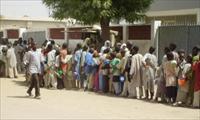NIGERIA: Emergency rice import cancelled

Friday, May 16, 2008
A
decision by the Nigerian government to reverse an earlier decision to
import 50,000 metric tonnes of rice from Thailand to ease supply
pressures on rice in Africa’s most populous country was met with mixed
reactions.
Yau Aladuwa, a 60-year old peasant in the farming village of Buntusu in northern Jigawa state, told IRIN: “This decision not to import the rice has thrown us into despair because we thought the [rice] import would ease the food shortage we are experiencing”.
Harvests from last season were poor and higher food prices this year have forced many into begging and menial jobs, Aladuwa said.
However Ahmed Rabiu, vice president of Kano Chamber of Commerce, told IRIN the massive order never made sense.
“It would have taken a minimum of three months to import and distribute the rice to the people that needed it and by then many farmers will have started harvesting their crops which will make the import worthless,” he explained.
The Nigerian government had on 1 May announced it would import 50,000 metric tonnes of rice worth US$600 million as an interim measure “to cushion the impact of global food crisis on vulnerable Nigerians”.
One week later, on 7 May, agriculture minister Abba Sayyadi Ruma rescinded the import decision and instead approved the investment of US$85 million in a credit scheme meant to support local rice processing as part of measures to attain food sufficiency.
The government also suspended duties on rice imports for six months and ordered the release of 11,000 metric tonnes of grains from its strategic food reserves for sale at one-sixth its market value.
Sabo Nanono, head of Kano chapter of Nigeria’s commercial farmers union said the decision to invest in the domestic agriculture sector was the right one, even though it will not achieve as much populist enthusiasm as the rice imports.
He estimated that Nigeria has conditions favourable enough to become a net exporter of rice, given the right tools, seeds and irrigation.
“It is a wise decision that the government reversed the idea of importing the rice,” Nanono said.
Poor harvests in some parts of Nigeria in 2007 were due to shorter than necessary rainfall and a locust invasion. In some cities in northern Nigeria, streets are now swarming with child beggars, sent out to earn by impoverished families struggling to afford enough to eat as they wait for the rainy season to start.
According to the agriculture ministry, 91 million Nigerians representing 65 percent of the country’s population are food insecure.
Yau Aladuwa, a 60-year old peasant in the farming village of Buntusu in northern Jigawa state, told IRIN: “This decision not to import the rice has thrown us into despair because we thought the [rice] import would ease the food shortage we are experiencing”.
Harvests from last season were poor and higher food prices this year have forced many into begging and menial jobs, Aladuwa said.
However Ahmed Rabiu, vice president of Kano Chamber of Commerce, told IRIN the massive order never made sense.
“It would have taken a minimum of three months to import and distribute the rice to the people that needed it and by then many farmers will have started harvesting their crops which will make the import worthless,” he explained.
The Nigerian government had on 1 May announced it would import 50,000 metric tonnes of rice worth US$600 million as an interim measure “to cushion the impact of global food crisis on vulnerable Nigerians”.
One week later, on 7 May, agriculture minister Abba Sayyadi Ruma rescinded the import decision and instead approved the investment of US$85 million in a credit scheme meant to support local rice processing as part of measures to attain food sufficiency.
The government also suspended duties on rice imports for six months and ordered the release of 11,000 metric tonnes of grains from its strategic food reserves for sale at one-sixth its market value.
Sabo Nanono, head of Kano chapter of Nigeria’s commercial farmers union said the decision to invest in the domestic agriculture sector was the right one, even though it will not achieve as much populist enthusiasm as the rice imports.
He estimated that Nigeria has conditions favourable enough to become a net exporter of rice, given the right tools, seeds and irrigation.
“It is a wise decision that the government reversed the idea of importing the rice,” Nanono said.
Poor harvests in some parts of Nigeria in 2007 were due to shorter than necessary rainfall and a locust invasion. In some cities in northern Nigeria, streets are now swarming with child beggars, sent out to earn by impoverished families struggling to afford enough to eat as they wait for the rainy season to start.
According to the agriculture ministry, 91 million Nigerians representing 65 percent of the country’s population are food insecure.
Source: IRIN NEWS http://irinnews.org
 Back and Next - Back and Next
Back and Next - Back and Next See Also - See Also
See Also - See Also